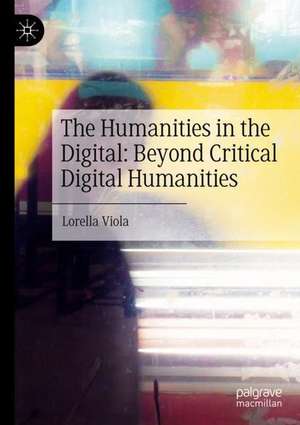The Humanities in the Digital: Beyond Critical Digital Humanities
Autor Lorella Violaen Limba Engleză Hardback – 21 mar 2023
Preț: 1042.93 lei
Preț vechi: 1303.67 lei
-20% Nou
Puncte Express: 1564
Preț estimativ în valută:
199.58€ • 208.63$ • 168.65£
199.58€ • 208.63$ • 168.65£
Carte tipărită la comandă
Livrare economică 07-21 martie
Preluare comenzi: 021 569.72.76
Specificații
ISBN-13: 9783031169496
ISBN-10: 3031169492
Pagini: 173
Ilustrații: XXVI, 173 p. 18 illus., 12 illus. in color.
Dimensiuni: 148 x 210 mm
Greutate: 0.39 kg
Ediția:1st ed. 2023
Editura: Springer International Publishing
Colecția Palgrave Macmillan
Locul publicării:Cham, Switzerland
ISBN-10: 3031169492
Pagini: 173
Ilustrații: XXVI, 173 p. 18 illus., 12 illus. in color.
Dimensiuni: 148 x 210 mm
Greutate: 0.39 kg
Ediția:1st ed. 2023
Editura: Springer International Publishing
Colecția Palgrave Macmillan
Locul publicării:Cham, Switzerland
Cuprins
Chapter 1. The Humanities in the Digital.- Chapter 2. The Importance of Being Digital.- Chapter 3. The Opposite of Unsupervised.- Chapter 4. How Discrete.- Chapter 5. What the Graph.- Chapter 6. Conclusion.
Notă biografică
Lorella Viola is Research Associate in Linguistics and Digital Humanities at the Luxembourg Centre for Contemporary and Digital History (C2DH), University of Luxembourg. Her research investigates the impact of the digital transformation of society on knowledge creation theory and practice and how power, latent assumptions and implicit ideologies are manifested through language and circulated in media and society.
Textul de pe ultima copertă
This open access book challenges the contemporary relevance of the current model of knowledge production. It argues that the full digitisation of society sharply accelerated by the COVID-19 pandemic has added extreme complexity to the world, conclusively exposing the inadequacy of our current model of knowledge creation. Addressing many of the different ways in which reality has been transformed by technology – the pervasive adoption of big data, the fetishisation of algorithms and automation, and the digitalisation of education and research – Viola examines how the rigid conceptualisation in disciplines’ division and competition is complicit of promoting a narrative which has paired computational methods with exactness and neutrality whilst stigmatising consciousness and criticality as carriers of biases and inequality. Taking the humanities as a focal point, the author retraces schisms in the field between the humanities, the digital humanities and critical digital humanities; theseare embedded, she argues, within old dichotomies: sciences vs humanities, digital vs non-digital and authentic vs non-authentic. Through the analysis of personal use cases and exploring a variety of applied contexts such as digital heritage practices, digital linguistic injustice, critical digital literacy and critical digital visualisation, the book shows a third way: knowledge creation in the digital.
Lorella Viola is Research Associate in Linguistics and Digital Humanities at the Luxembourg Centre for Contemporary and Digital History (C2DH), University of Luxembourg. Her research investigates the impact of the digital transformation of society on knowledge creation theory and practice and how power, latent assumptions and implicit ideologies are manifested through language and circulated in media and society.
Lorella Viola is Research Associate in Linguistics and Digital Humanities at the Luxembourg Centre for Contemporary and Digital History (C2DH), University of Luxembourg. Her research investigates the impact of the digital transformation of society on knowledge creation theory and practice and how power, latent assumptions and implicit ideologies are manifested through language and circulated in media and society.
Caracteristici
Addresses urgent debates at the foundations of digital knowledge production Encourages us to rethink the larger academic relevance of digital objects, data and algorithms Essential reading for academics, students and practitioners in digital studies This book is open access, which means that you have free and unlimited access
